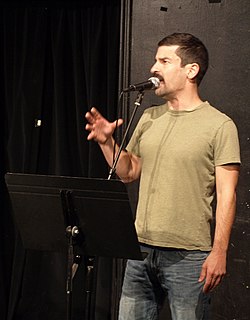A Quote by Mike Birbiglia
My writing process is very feedback-based. When I do stand-up, I listen to the audience. I try to understand what's connecting, what's not connecting, and then rewrite, rewrite and rewrite.
Quote Topics
Related Quotes
My writing process is very feedback based - I listen to the audience. I try to understand what's connecting, what's not connecting... and then rewrite, and rewrite, and rewrite. Chris Gethard and I have been on the road a lot together. When we get on the bus at night, we talk about the jokes that didn't work and the joke possibilities that could work. I think this is a little different from other writers.
Good writing is writing and rewriting and rewriting and rewriting. Sometimes, it happens to work right away, and that's amazing. But most of the time, it happens to work, and then you rewrite and rewrite and rewrite, and maybe it even comes back to the thing it was in the first place, but then you know for sure that it is good, and it's what you wanted to do.
There were guys in 'The State' who would take one script and rewrite it and rewrite it and rewrite it and fight for it for a whole season, and after a couple of seasons, you realized that doesn't work. You have to just be willing to throw something away, no matter how good it is, and write a better joke.
I never think of an entire book at once. I always just start with a very small idea. In 'Holes,' I just began with the setting; a juvenile correctional facility located in the Texas desert. Then I slowly make up the story, and rewrite it several times, and each time I rewrite it, I get new ideas, and change the old ideas around.
I really - I don't take my work that seriously, and I think that's what keeps me loose. If I try to write, if I catch myself trying to write, I'll fall right on my face. I'll see it. If I see in the prose that I'm - 'Boy, look at me writing,' I rewrite it. I rewrite it because I don't, because I think it's distracting.































